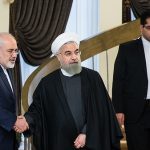News and views relevant to U.S.-Iran relations for September 1, 2010.
- The Wall Street Journal: The WSJ editorial board uses two 30-year-old letters from the Imam of the Park 51 community center, Feisal Abdul Rauf, to show Rauf’s alleged anti-Israel and pro-Iranian revolution leanings. Egyptian president Anwar Sadat’s 1977 outreach to Israel led Rauf to write, “In a true peace, Israel will, in our lifetimes, become one more Arab country, with a Jewish minority.” In a letter written after the 1979 Iranian revolution, he observed the American and Iranian revolution shared “the very principles of individual rights and freedom”. In Rauf’s response to the WSJ’s publication of his letters, he wrote, “As I re-read those letters now, I see that they express the same concerns—a desire for peaceful solutions in Israel, and for a humane understanding of Iran.”
- National Review Online: At NRO‘s The Corner blog, Benjamin Weinthal lays out a ‘reverse linkage’ — turning around the usual military/realist thinking that Israeli-Arab peace will help the U.S. deal with other regional issues. He writes, “To bring about peace with longevity between the Palestinians and Israel, the Obama administration has to confront Iran, which means promoting democracy in Iran and terminating its nuclear-weapons program.” Weinthal asserts, “if the sanctions prove impotent, Obama will then have to turn to serious saber-rattling and lay out a blueprint for military intervention.” The statement rehashes the catchphrase from the early 2000s that ‘the road to Mid East peace runs through Baghdad’ – only now it’s rerouted through Tehran.
- The New York Times: David Sanger writes about the linkages between Israeli-Palestinian peace, Iraq and Iran. He argues while other presidents have dealt with these linkages, Obama faces a new variation with U.S. forces pulling out of Iraq, tough sanctions on Iran and and the slow emergence of a working Palestinian government in the West Bank. With the withdrawal from Iraq, Obama can claim victory over that source of instability and, according to Sanger’s sources, progress on Iran. Sanger interviews WINEP cofounders Martin Indyk, the Vice President for Foreign Policy at the Brookings Institution and former U.S. ambassador to Israel and Senior Mideast diplomat Dennis Ross, special adviser for the Persian Gulf and Southwest Asia to Secretary of State Hillary Clinton. Ross currently works out of the National Security Council, where he focuses on Iran, and has served in the past two administrations. Indyk and Ross agree sanctions have made progress in isolating and containing Iran. “We finally have leverage,” said Ross, pointing to talk from Iranian officials about the possibility of negotiations with the West.





Israel (or should one say Palestine?) an Arab country with a Jewish minority: wouldn’t that be a just solution to the IP problem? (Assuming, of course, that the minority’s rights were fully protected — something that Israel has signally failed to do as regards the Palestinians.)
Ross may be right. Let’s hope so. A peaceful solutiion that all sides can accept is what we want; the actual parameters are less important. Nothing would please me more than to be able to stop worrying about the wretched Middle East. Surely Lobelog’s writers would be pleased if sanctions “worked” to bring about an agreement?